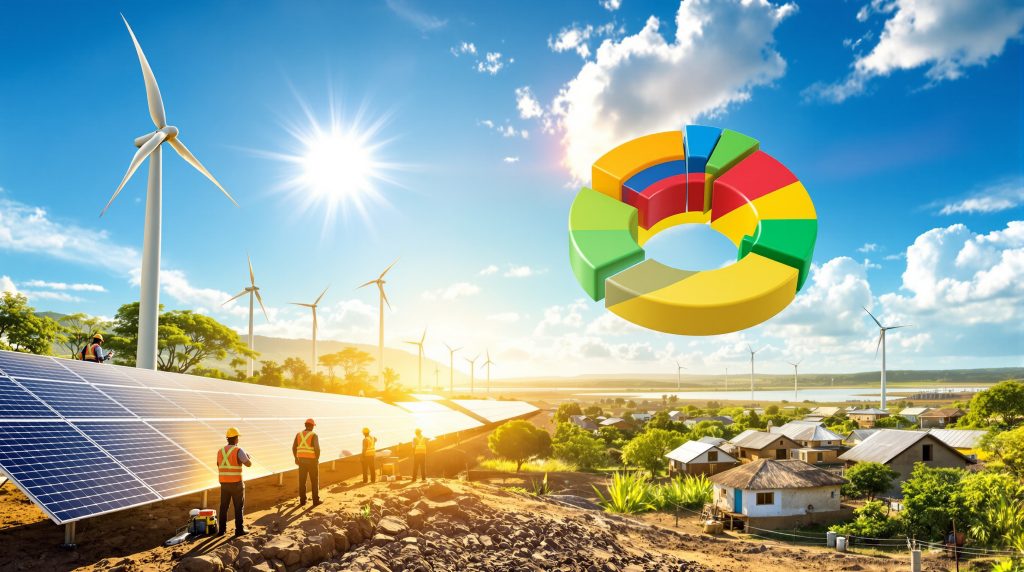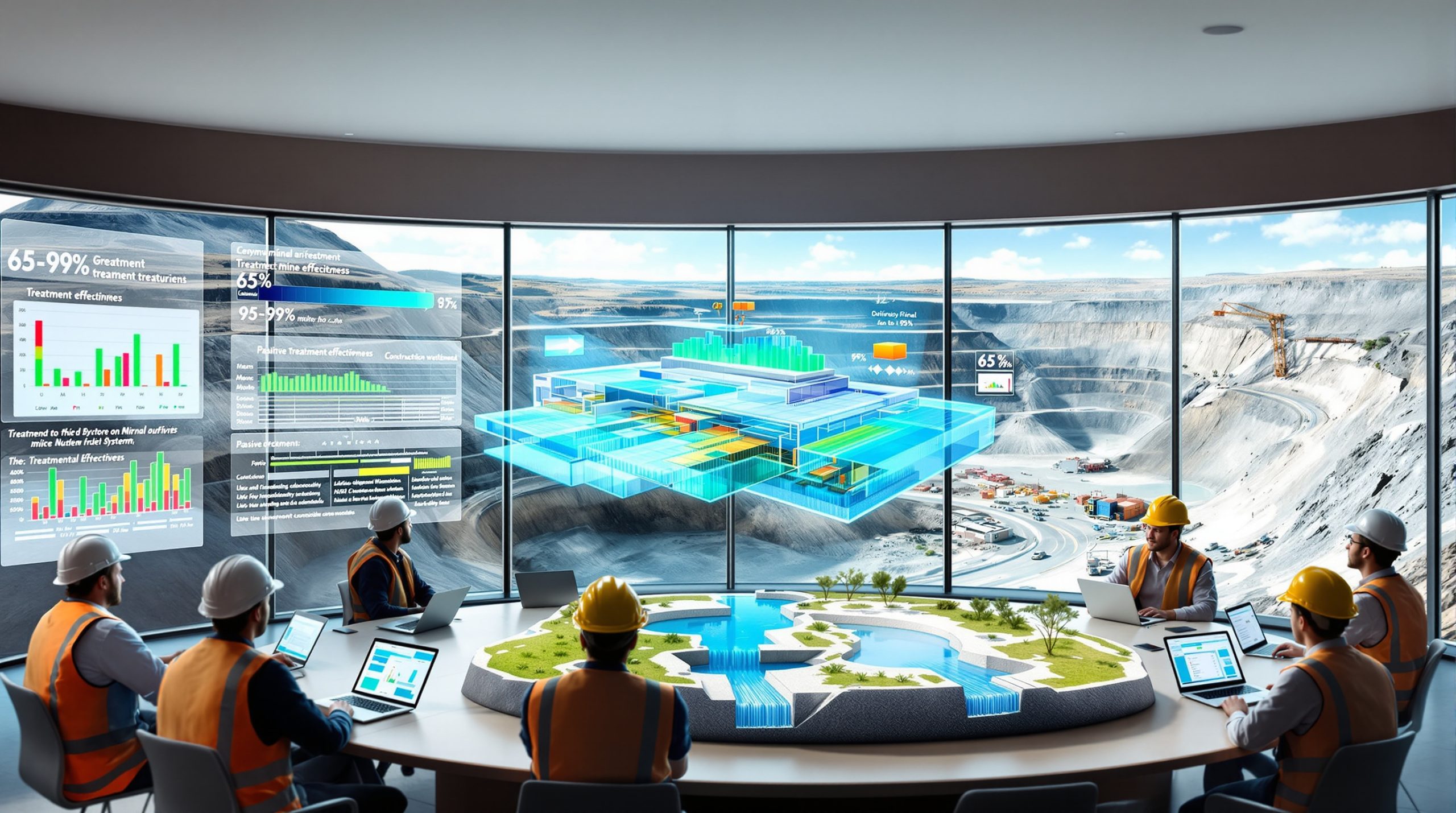Mozambique's Green Energy Revolution: Powering Sustainable Development
Mozambique stands at a pivotal moment in its energy journey, leveraging abundant natural resources to pioneer a green energy revolution. The country's strategic shift toward renewable energy is reshaping its economic landscape while addressing critical power needs across the region. This transformation is driven by a combination of favorable geography, international partnerships, and forward-thinking government policies focused on energy transition strategies.
Recent developments underscore this momentum, with the Mozambican government approving 115 investment projects valued at approximately US$5 billion in the first half of 2025. These initiatives hold the potential to create 17,000 jobs across various sectors, signaling robust investor confidence in Mozambique's sustainable growth trajectory.
How Does Mozambique's Renewable Potential Compare Globally?
Mozambique possesses exceptional renewable energy potential that places it among Africa's most promising green energy markets. The country's geographical advantages provide multiple pathways for sustainable energy development that rivals established renewable leaders worldwide.
Natural Resource Advantages
Mozambique's renewable energy profile includes diverse and abundant resources:
-
Solar energy: 2.7 GW potential capacity with average solar irradiation of 5-6 kWh/m²/day, comparable to solar-rich regions in Australia and the American Southwest
-
Hydropower: 18 GW total potential with only 2.1 GW currently developed, representing one of Africa's largest untapped hydro resources
-
Wind energy: 4.5 GW estimated capacity, particularly in coastal areas where wind speeds consistently reach 7-8 m/s
-
Biomass: Significant untapped potential from agricultural waste and forestry resources, estimated at 2 GW of generation capacity
The combination of these resources positions Mozambique uniquely among developing nations, with per-capita renewable potential exceeding many European countries despite current lower utilization rates.
What Major Green Energy Projects Are Transforming Mozambique?
Mozambique's renewable landscape is evolving rapidly through strategic investments in large-scale projects that leverage the country's natural advantages. These initiatives represent cornerstone developments in the national sustainability transformation.
Flagship Developments
| Project | Type | Capacity | Investment | Status |
|---|---|---|---|---|
| Green Energy Mozambique Industrial Park | Multi-resource complex | Various | US$3 billion | Approved (2025) |
| Tete Province Solar Plant | Solar PV | 300 MW | US$300 million | Under development |
| Cahora Bassa North Bank | Hydropower | 1,245 MW | US$700+ million | Planning phase |
| Namaacha Wind Farm | Wind | 60 MW | US$120 million | Feasibility study |
| Mocuba Solar Plant | Solar PV | 40 MW | US$76 million | Operational |
The Green Energy Mozambique industrial park represents the largest integrated renewable energy initiative in the country's history. Located in Sofala province, this US$3 billion complex combines manufacturing and energy production capabilities, with facilities for aluminum, steel, cement, batteries, and solar panels. The project exemplifies Mozambique's holistic approach to renewable development, creating approximately 10,000 direct jobs while establishing domestic manufacturing capabilities for the renewable supply chain.
More than 88% of total investment in recent approvals has been directed to Sofala province, highlighting its emergence as a renewable energy hub for the region.
How Is International Investment Shaping Mozambique's Green Energy Landscape?
Mozambique's renewable transition has attracted substantial international support, with foreign capital accounting for US$3.2 billion from investors in 25 countries in the first half of 2025 alone. This influx of investment reflects growing global confidence in Mozambique's renewable energy potential.
Strategic Partnerships and Funding
Several major international partnerships are accelerating Mozambique's renewable energy development:
-
The World Bank has committed over US$500 million to various renewable projects, focusing on grid improvements and rural electrification
-
The European Development Fund allocated €15 million specifically for renewable entrepreneurs and small-scale energy projects
-
The International Finance Corporation (IFC) launched tenders for up to 200 MW of solar and wind capacity with private sector participation
-
Qatar's Al Mansour Holdings recently signed a US$20 billion investment deal with partial focus on energy infrastructure development
-
Development finance institutions from Portugal, Norway, and France have established dedicated renewable funding programs to support Mozambique's transition
These partnerships provide not just capital but also technical expertise, knowledge transfer, and international best practices that enhance local capacity building. Foreign direct investment in Mozambique reached US$3.55 billion in 2024, ranking the country fourth in Africa for FDI inflows, up from US$2.5 billion in 2023.
What Policy Framework Supports Mozambique's Green Energy Goals?
Mozambique has established a comprehensive policy framework to accelerate renewable adoption, creating an enabling environment for investment opportunities and project development.
Government Initiatives and Targets
Key policy mechanisms supporting the renewable transition include:
-
Energy for All Program: Targeting 100% electricity access by 2030 through grid expansion and off-grid solutions
-
Renewable Energy Strategy: Established in 2011 and updated in 2021 to reflect technological advances and cost reductions
-
National Electrification Strategy: Integrating on-grid and off-grid solutions with clear implementation pathways
-
Public-Private Partnership Law: Facilitating private investment in energy infrastructure through transparent processes
-
Renewable Energy Feed-in Tariff: Providing guaranteed pricing for renewable generators based on technology and scale
The government's adoption of a new investment law in 2023 and creation of the Investment and Export Promotion Agency (APIEX) further strengthen the institutional framework for renewable energy development. The country now offers tax and customs incentives, along with special economic zones to accelerate growth in strategic sectors.
Mozambique has set ambitious targets including:
- 20% renewable energy share by 2040 (excluding large hydropower)
- 98% renewable electricity generation by 2025 (including hydropower)
- Increasing total installed capacity to over 6,000 MW by 2030
These policy mechanisms create a stable, predictable environment that has helped attract the recent wave of investment approvals.
How Will Green Energy Transform Mozambique's Economy?
The renewable energy transition is creating multifaceted benefits for Mozambique's economy, extending beyond direct electricity generation to encompass manufacturing, employment, and broader development impacts.
Economic and Social Impact
Key economic transformations include:
-
Job creation: The 115 recently approved investment projects are expected to generate 17,000+ new positions across various sectors, with 10,000 direct jobs from the Green Energy Mozambique industrial park alone
-
Industrial development: Manufacturing capabilities for renewable components including solar panels and lithium battery innovations are being established domestically
-
Energy independence: Reducing reliance on imported fossil fuels strengthens energy security and improves trade balance
-
Rural electrification: Expanding energy access from current 60.1% to targeted 100% enables economic activity in previously underserved communities
-
Export potential: As domestic capacity grows, Mozambique is positioning to become a regional clean energy exporter
-
Skills development: Technical training programs associated with major projects are building human capital in renewable technologies
Prime Minister Benvinda Levi has emphasized that these investment results demonstrate Mozambique's economic recovery following climate disruptions and post-election tensions, with the private sector driving sustainable growth.
Beyond direct economic metrics, increased energy access is improving healthcare delivery, educational outcomes, and small business opportunities in communities previously limited by energy poverty.
What Challenges Must Mozambique Overcome in Its Green Energy Journey?
Despite significant progress, Mozambique faces several challenges in fully realizing its renewable energy potential. Addressing these barriers requires coordinated action across public and private sectors.
Addressing Implementation Barriers
Key challenges include:
-
Grid infrastructure limitations: Aging transmission networks require modernization to accommodate variable renewable sources and reach underserved areas
-
Regulatory complexity: Project approval processes can be lengthy, increasing development timelines and costs for investors
-
Technical capacity gaps: Building local expertise in renewable technologies remains an ongoing need, particularly for operation and maintenance
-
Climate vulnerability: Renewable infrastructure must be designed to withstand extreme weather events, which have historically impacted the country
-
Financing accessibility: While large projects attract international funding, smaller-scale initiatives often face financing hurdles
-
Regional coordination: Cross-border energy trading frameworks need harmonization to maximize export opportunities
Industry stakeholders are developing innovative solutions to these challenges, including public-private partnerships for infrastructure development, phased implementation approaches that build capacity incrementally, and dedicated training programs to develop technical expertise. The launch of a US$250 million mutual guarantee fund during the recent Maputo International Fair represents one mechanism to address financing challenges for private sector participants.
How Does Mozambique's Green Energy Strategy Address Climate Resilience?
Mozambique's vulnerability to climate impacts necessitates an approach to renewable energy that incorporates resilience planning. The country's renewable energy strategy acknowledges these risks while building adaptive capacity.
Adaptation and Mitigation Measures
Climate resilience is being integrated into renewable energy planning through:
-
Diversifying energy sources to reduce vulnerability to climate impacts on any single resource
-
Implementing decentralized mini-grids that improve system redundancy and localized resilience
-
Integrating climate risk assessments into project planning phases to identify vulnerabilities
-
Developing early warning systems for extreme weather events that could affect energy infrastructure
-
Exploring hybrid systems combining multiple renewable sources to enhance stability and weather resilience
-
Implementing nature-based solutions to protect energy infrastructure from flooding and erosion
These measures recognize that Mozambique's history of climate challenges, including cyclones and floods, requires forward-thinking infrastructure design. Prime Minister Levi has acknowledged that climate shocks have affected economic development in the past, highlighting the importance of building resilient systems for the future.
What Role Will Community-Based Projects Play in Mozambique's Energy Future?
While large infrastructure projects form the backbone of Mozambique's energy transition, smaller-scale, community-centered initiatives play a crucial complementary role in extending energy access and creating inclusive development.
Decentralized and Inclusive Approaches
Community-based renewable energy initiatives include:
-
Solar home systems: Providing basic electricity access to remote households beyond the grid's economic reach
-
Mini-grids: Serving community clusters with localized generation and distribution systems
-
Productive use applications: Powering agricultural processing, irrigation, and small businesses to enhance local economies
-
Community ownership models: Ensuring local benefits and stakeholder engagement through participatory structures
-
Skills development programs: Building maintenance and operation capabilities within communities
-
Microfinance schemes: Enabling household investment in renewable technologies through accessible financing
These approaches accelerate energy access while empowering communities to participate actively in the renewable transition. By combining centralized and decentralized approaches, Mozambique can achieve more rapid progress toward universal electricity access while building resilient, community-supported energy systems.
How Is Mozambique Positioning as a Regional Green Energy Hub?
Mozambique's geographic position and resource abundance create opportunities for regional leadership in renewable energy. The country is strategically developing cross-border connections and harmonized frameworks to facilitate energy exports.
Strategic Regional Integration
Key elements of Mozambique's regional positioning include:
-
Developing cross-border transmission infrastructure with neighboring countries including South Africa, Zimbabwe, and Malawi
-
Participating in the Southern African Power Pool to facilitate energy trading and optimize regional resource utilization
-
Establishing renewable energy industrial zones near borders to facilitate export-oriented manufacturing
-
Harmonizing regulatory frameworks to enable seamless energy exports to energy-deficient neighbors
-
Building specialized training centers to serve the regional workforce and knowledge exchange
-
Collaborating on shared renewable resource assessment and planning to maximize complementary advantages
By 2050, Mozambique aims to leverage 14 GW of hydropower, 7.5 GW of solar, and 2.5 GW of wind capacity to become a clean energy powerhouse for Southern Africa. This regional positioning aligns with broader African integration initiatives while creating sustainable export opportunities for Mozambique's economy.
What Does the Future Hold for Green Energy in Mozambique?
Mozambique's renewable energy trajectory points toward transformative growth over the coming decades. Current investment patterns suggest acceleration of deployment across multiple technologies and increased battery metals investment.
Long-Term Vision and Projections
The country's renewable energy future is expected to include:
-
Complete transition from energy importer to net exporter, generating foreign exchange and strengthening economic resilience
-
Development of green hydrogen production capabilities leveraging abundant renewable resources
-
Integration of advanced energy storage technologies to enhance grid stability and renewable utilization
-
Establishment as a manufacturing hub for renewable components serving African markets
-
Creation of specialized green energy economic zones focusing on energy-intensive sustainable industries
-
Leadership in climate-resilient energy system design applicable to other developing nations
With continued policy support and investment, Mozambique is positioned to become a model for sustainable energy development in Africa and beyond. Current trends, including the US$5 billion in approved projects during the first half of 2025, indicate strengthening momentum toward this vision.
FAQ: Mozambique's Green Energy Landscape
What percentage of Mozambique currently has access to electricity?
As of 2025, approximately 60.1% of Mozambique's population has access to electricity, with significant urban-rural disparities. The government's "Energy for All" program aims to achieve universal access by 2030 through a combination of grid extension and decentralized solutions.
How much of Mozambique's current electricity comes from renewable sources?
Currently, about 85% of Mozambique's electricity generation comes from renewable sources, predominantly hydropower from the Cahora Bassa dam. The country aims to increase this to 98% by 2025 while diversifying into solar, wind, and smaller hydropower projects.
What is the largest renewable energy project in Mozambique?
The Green Energy Mozambique industrial park in Sofala province represents the largest integrated renewable energy initiative at US$3 billion, combining manufacturing facilities for aluminum, steel, cement, batteries, and solar panels with energy production capabilities.
How is climate change affecting Mozambique's energy planning?
Mozambique's vulnerability to extreme weather events, including cyclones and droughts, has prompted the integration of climate resilience measures into energy planning. These include diversification of sources, decentralized systems, and infrastructure designed to withstand climate impacts.
What role do private companies play in Mozambique's renewable energy sector?
Private sector participation is central to Mozambique's energy strategy, with international and domestic companies involved in project development, financing, technology transfer, and operations across the renewable spectrum. Recent government initiatives, including the mutual guarantee fund, aim to further expand private sector involvement through accelerated renewable investment.
Want to Capitalise on the Next Major Mineral Discovery?
Discover how pioneering investors gain early advantage from significant ASX mineral discoveries with Discovery Alert's proprietary Discovery IQ model, providing real-time alerts and actionable insights ahead of market movements. Explore historic examples of exceptional returns from major discoveries on our dedicated discoveries page and begin your 30-day free trial today.




